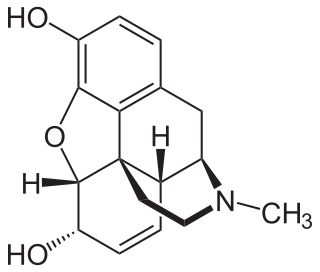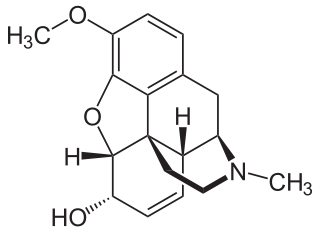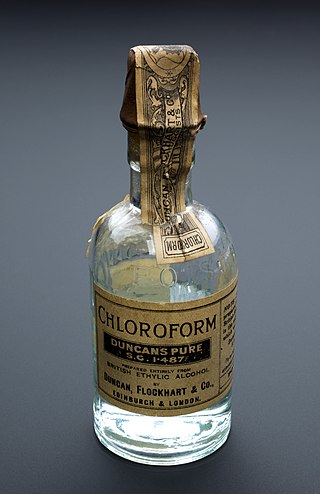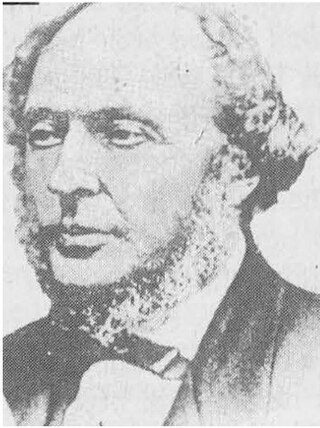
Morphine, formerly also called morphia, is a strong opiate that is found naturally in opium, a dark brown resin produced by drying the latex of opium poppies. It is mainly used as an analgesic. There are numerous methods used to administer morphine: oral; sublingual; via inhalation; injection into a muscle, injection under the skin, or injection into the spinal cord area; transdermal; or via rectal suppository. It acts directly on the central nervous system (CNS) to induce analgesia and alter perception and emotional response to pain. Physical and psychological dependence and tolerance may develop with repeated administration. It can be taken for both acute pain and chronic pain and is frequently used for pain from myocardial infarction, kidney stones, and during labor. Its maximum effect is reached after about 20 minutes when administered intravenously and 60 minutes when administered by mouth, while the duration of its effect is 3–7 hours. Long-acting formulations of morphine are available as MS-Contin, Kadian, and other brand names as well as generically.

Opium is dried latex obtained from the seed capsules of the opium poppy Papaver somniferum. Approximately 12 percent of opium is made up of the analgesic alkaloid morphine, which is processed chemically to produce heroin and other synthetic opioids for medicinal use and for the illegal drug trade. The latex also contains the closely related opiates codeine and thebaine, and non-analgesic alkaloids such as papaverine and noscapine. The traditional, labor-intensive method of obtaining the latex is to scratch ("score") the immature seed pods (fruits) by hand; the latex leaks out and dries to a sticky yellowish residue that is later scraped off and dehydrated.

Thebaine (paramorphine), also known as codeine methyl enol ether, is an opiate alkaloid, its name coming from the Greek Θῆβαι, Thēbai (Thebes), an ancient city in Upper Egypt. A minor constituent of opium, thebaine is chemically similar to both morphine and codeine, but has stimulatory rather than depressant effects. At high doses, it causes convulsions similar to strychnine poisoning. The synthetic enantiomer (+)-thebaine does show analgesic effects apparently mediated through opioid receptors, unlike the inactive natural enantiomer (−)-thebaine. While thebaine is not used therapeutically, it is the main alkaloid extracted from Papaver bracteatum and can be converted industrially into a variety of compounds, including hydrocodone, hydromorphone, oxycodone, oxymorphone, nalbuphine, naloxone, naltrexone, buprenorphine, butorphanol and etorphine.

The term narcotic originally referred medically to any psychoactive compound with numbing or paralyzing properties. In the United States, it has since become associated with opiates and opioids, commonly morphine and heroin, as well as derivatives of many of the compounds found within raw opium latex. The primary three are morphine, codeine, and thebaine.

Laudanum is a tincture of opium containing approximately 10% powdered opium by weight. Laudanum is prepared by dissolving extracts from the opium poppy in alcohol (ethanol).

Paregoric, or camphorated tincture of opium, also known as tinctura opii camphorata, is a traditional patent medicine known for its antidiarrheal, antitussive, and analgesic properties.

Denatonium, usually available as denatonium benzoate and as denatonium saccharide (BITTERANT-s), is the most bitter chemical compound known, with bitterness thresholds of 0.05 ppm for the benzoate and 0.01 ppm for the saccharide. It was discovered in 1958 during research on local anesthetics by T. & H. Smith of Edinburgh, Scotland, and registered under the trademark Bitrex.

The Papaveraceae, informally known as the poppy family, are an economically important family of about 42 genera and approximately 775 known species of flowering plants in the order Ranunculales. The family is cosmopolitan, occurring in temperate and subtropical climates like Eastern Asia as well as California in North America. It is almost unknown in the tropics. Most are herbaceous plants, but a few are shrubs and small trees. The family currently includes two groups that have been considered to be separate families: Fumariaceae and Pteridophyllaceae. Papaver is the classical name for poppy in Latin.

Papaver somniferum, commonly known as the opium poppy or breadseed poppy, is a species of flowering plant in the family Papaveraceae. It is the species of plant from which both opium and poppy seeds are derived and is also a valuable ornamental plant grown in gardens. Its native range was east of the Mediterranean Sea, but has since been obscured and vastly expanded by introduction and cultivation from ancient times to the present day, being naturalized across much of Europe and Asia.

Papaverine is an opium alkaloid antispasmodic drug, used primarily in the treatment of visceral spasms and vasospasms, occasionally in the treatment of erectile dysfunction and acute mesenteric ischemia. While it is found in the opium poppy, papaverine differs in both structure and pharmacological action from the analgesic morphine and its derivatives.
The British Pharmacopoeia (BP) is the national pharmacopoeia of the United Kingdom. It is an annually published collection of quality standards for medicinal substances in the UK, which is used by individuals and organisations involved in pharmaceutical research, development, manufacture and testing.

Codeine is an opiate and prodrug of morphine mainly used to treat pain, coughing, and diarrhea. It is also commonly used as a recreational drug. It is found naturally in the sap of the opium poppy, Papaver somniferum. It is typically used to treat mild to moderate degrees of pain. Greater benefit may occur when combined with paracetamol (acetaminophen) or a nonsteroidal anti-inflammatory drug (NSAID) such as aspirin or ibuprofen. Evidence does not support its use for acute cough suppression in children. In Europe, it is not recommended as a cough medicine in those under 12 years of age. It is generally taken by mouth. It typically starts working after half an hour, with maximum effect at two hours. Its effects last for about four to six hours. Codeine exhibits abuse potential similar to other opioid medications, including a risk of habituation and overdose.
The Government Opium and Alkaloid Factories (GOAF) is an Indian government-owned organisation. Its headquarter is located in New Delhi. The overall supervision of the organisation comes under the purview of Department of Revenue, Ministry of Finance. There are two factories under this organisation - Government Opium and Alkaloid Works, Ghazipur (U.P.) and Government Opium and Alkaloid Works, Neemuch (M.P.).

Poppy straw is derived from opium poppies that are harvested when fully mature and dried by mechanical means. Opium poppy straw is what remains after the seed pods have been harvested - that is, the dried stalks, stem and leaves of poppies grown for their seeds. The field-dried leaves, stalk, and seed pod are then used in commercial manufacture of morphine or other poppy-alkaloid derived drugs, by first processing the material, separating the seeds, and then making concentrate of poppy straw where no extraction using the traditional methods of latex extraction has been made. The straw was originally considered an agricultural by-product of the mechanised poppy seed harvest, which was primarily grown for its edible and oil-producing seed. This changed in 1927 when János Kabay developed a chemical process to extract morphine from the crushed capsule. Concentrated poppy straw, consisting mainly of the crushed capsule without the seeds, soon became a valuable source of morphine. Today, concentrate of poppy straw is a major source of many opiates and other alkaloids. It is the source of 90% of the world supply of legal morphine and in some countries it also is a source of illegal morphine, which could be processed into illegal heroin.
The pharmaceutical industry in the United Kingdom directly employs around 73,000 people and in 2007 contributed £8.4 billion to the UK's GDP and invested a total of £3.9 billion in research and development. In 2007 exports of pharmaceutical products from the UK totalled £14.6 billion, creating a trade surplus in pharmaceutical products of £4.3 billion.
George Fowlie Merson FRSE FPS FCS (1866–1959) was a Scottish pharmacist who produced an artificial surgical catgut called Mersuture. In authorship he appears as G. F. Merson.

James Duncan FRSE FRCS FRCSE was a Scottish surgeon and manufacturing chemist responsible for much of the British supply of chloroform in the mid-19th century. From 1839 to 1866 he was Director of Duncan Flockhart & Co one of Scotland’s largest chemical manufacturers.
Donald Cumming Wilson FRSE FRIC (1898–1950) was a 20th-century Scottish manufacturing chemist. During the Second World War he controlled one of the main producers of military painkillers.

William Flockhart, L.R.C.S.E. was a Scottish chemist, a pharmacist who provided chloroform to Doctor James Young Simpson for his anaesthesia experiment at 52 Queen Street, Edinburgh on 4 November 1847. This was the first use of this chemical on humans when Simpson tried it on himself and a few friends, and then used it for pain relief in obstetrics, and surgery. This changed medical practice for over a century, according to the British Medical Journal.
Veranova, L.P. is an American multinational contract development and manufacturing organization (CDMO) based in Wayne, PA, with operations in North America and Europe.














